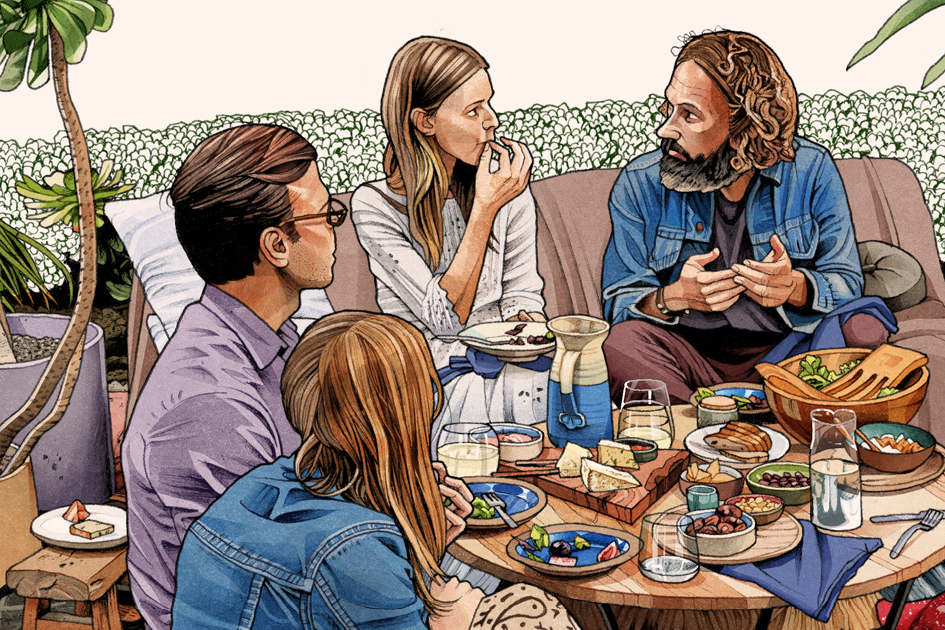One of the most iconic paintings in the world sits not in a museum but in the dining room of a convent in Milan. The Last Supper was commissioned to grace the meals and blessings of nuns eating together at Santa Maria delle Grazie, though the masterpiece’s fame has since turned the convent into a UNESCO World Heritage Site. Most of us can picture the image, having seen it in countless history books—Jesus and the disciples sit along one side of a long table, engaged in conversation as they eat. In fact, da Vinci’s portrayal of the Last Supper is so widely acclaimed that it’s often how we imagine the original moment recorded in chapters 13-17 of John’s gospel. But in clinging to the master’s rendition of this divine meal, we miss one critical and interesting detail: Jesus and the disciples weren’t sitting that night. They were reclining.
Reclining while eating was a Greek practice that Romans eventually adopted around the third century BC, so Jesus and the Twelve would have followed suit. Sure enough, Scripture alludes to this posture in details we often overlook—for example, when Jesus “was reclining at the table” as a woman poured expensive perfume on His head (Matt. 26:7), or when He “reclined at the table again” after having washed the disciples’ feet (John 13:12). Awareness of this changes our perception of the Last Supper, doesn’t it? The evening no longer resembles da Vinci’s formal setting but instead suggests a comfortable meal in the company of good friends. The air of relaxation is actually what made lying down while eating so attractive to Romans. It was a demonstration of security—which makes it all the more endearing when we read, “Lying back on Jesus’ chest was one of His disciples, whom Jesus loved” (John 13:23). Jesus was relaxed and secure, and His disciples were as well.
Another famous meal in which we overlook posture takes place in Matthew 9: “Then it happened that as Jesus was reclining at the table in the house, behold, many tax collectors and sinners came and began dining with Jesus and His disciples” (Matt. 9:10). We picture Jesus, the disciples, sinners, and tax collectors relaxing around the room, eating and conversing together—something our formal dining rooms with their straight-backed chairs simply can’t create. That is, until the Pharisees show up. They are quick to question Jesus’ eating and reclining with sinners, and He replies, “It is not those who are healthy who need a physician, but those who are sick” (Matt. 9:12). We typically interpret Jesus’ words to mean only sinners need fixing, but He is not “fixing” or healing any sinners here—He is reclining and dining with them. Fellowship is the priority. Then Jesus continues, “Now go and learn what this means: ‘I desire compassion, rather than sacrifice,’ for I did not come to call the righteous, but sinners” (Matt. 9:13). To the Pharisees’ disappointment (and perhaps our own), our standing with Jesus is not about performing the right tasks; it’s about being with Him and the people He loves.
Jesus is not “fixing” or healing any sinners—He is reclining and dining with them. Fellowship is the priority.
It’s like what Dr. Stanley says: “God wants us to know Him, not just settle problems. Not just answer particular needs that we have.” Isn’t that, after all, why Jesus took our sin to the cross? So that nothing would come between us and our Creator, so we could be once again reconciled as He’d intended in Eden? While we’re inclined to judge by outside appearances, the Father looks at the heart. And this perspective gives new life to every hardship we face, every sin we commit—because the Lord never expected us to handle them perfectly, only to move forward with Him by our side. Only to dine and recline with Him, to rest in the security and freedom of being loved by Him.
When Jesus offers to heal the centurion’s servant in Matthew 8, the soldier insists, “Lord, I am not worthy for You to come under my roof, but just say the word, and my servant will be healed” (Matt. 8:8). After Jesus commends the centurion for his faith, He reveals “many will come from east and west, and recline at the table with Abraham, Isaac, and Jacob in the kingdom of heaven” (Matt. 8:11). The kingdom of heaven looks a lot like lying back, eating, and resting with our Savior and friends—and every moment we spend with Him now brings a bit of paradise to earth. May we never forget Jesus’ promise: “If anyone hears My voice and opens the door, I will come in to him and will dine with him, and he with Me” (Rev. 3:20).


